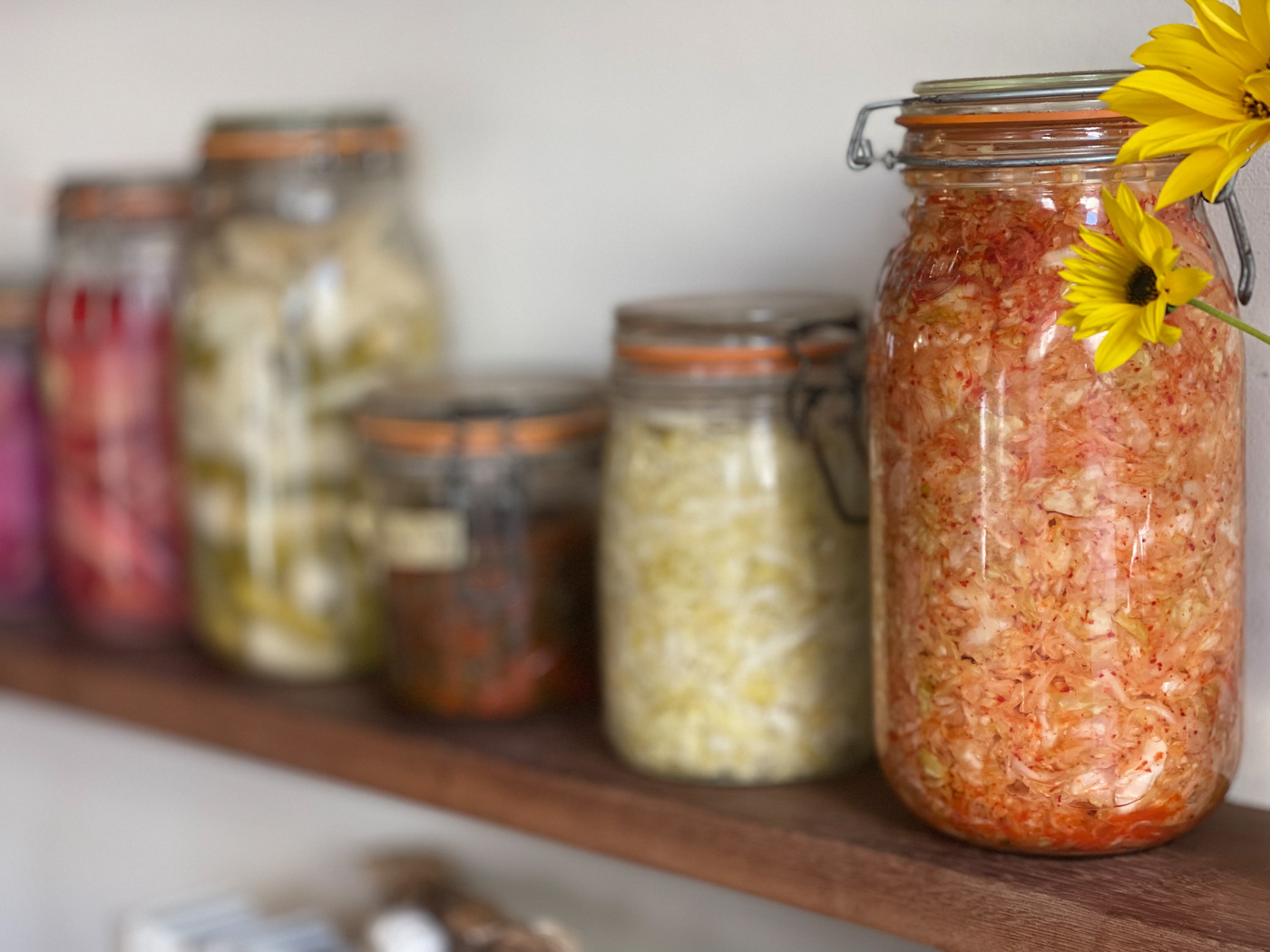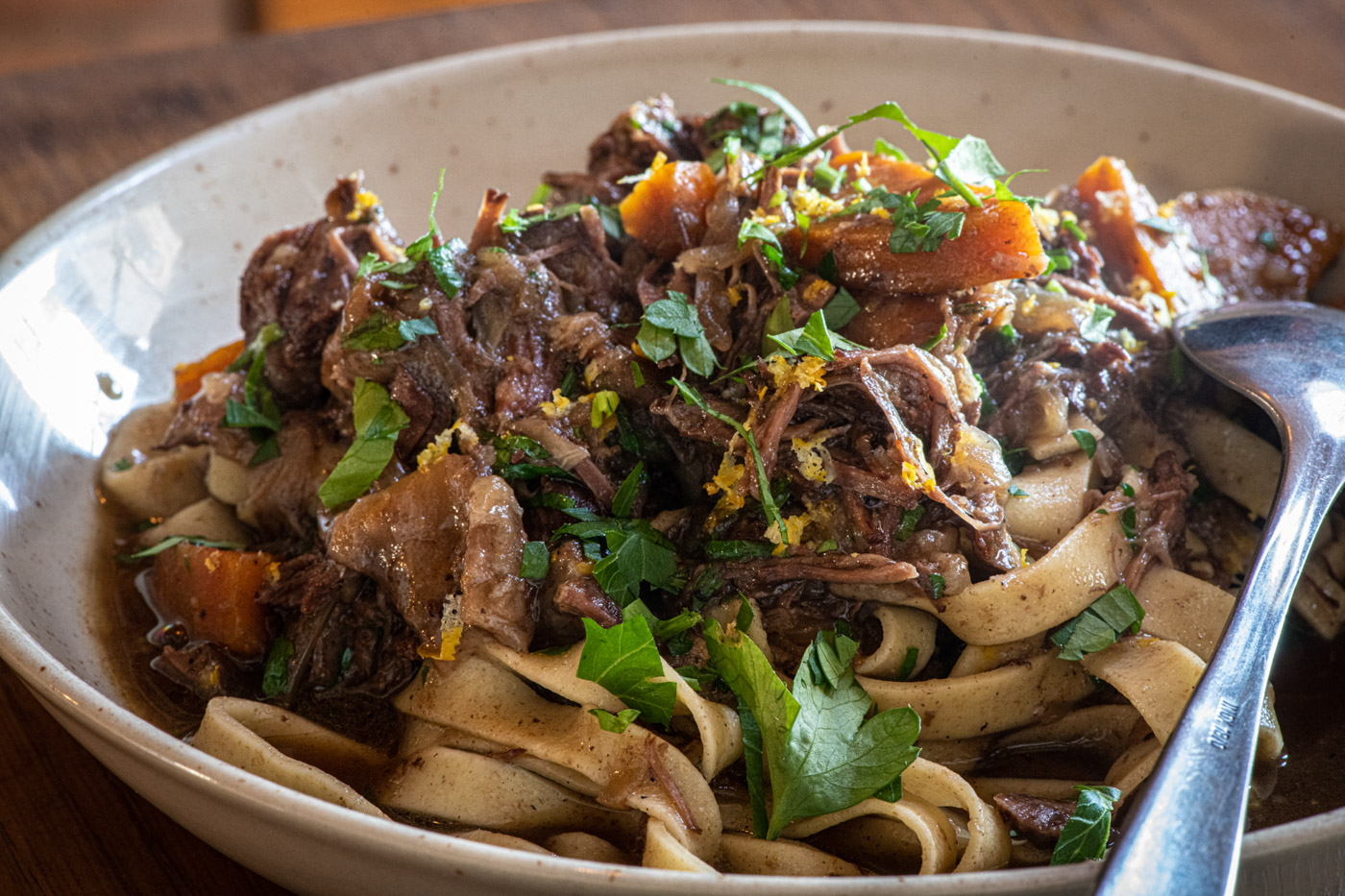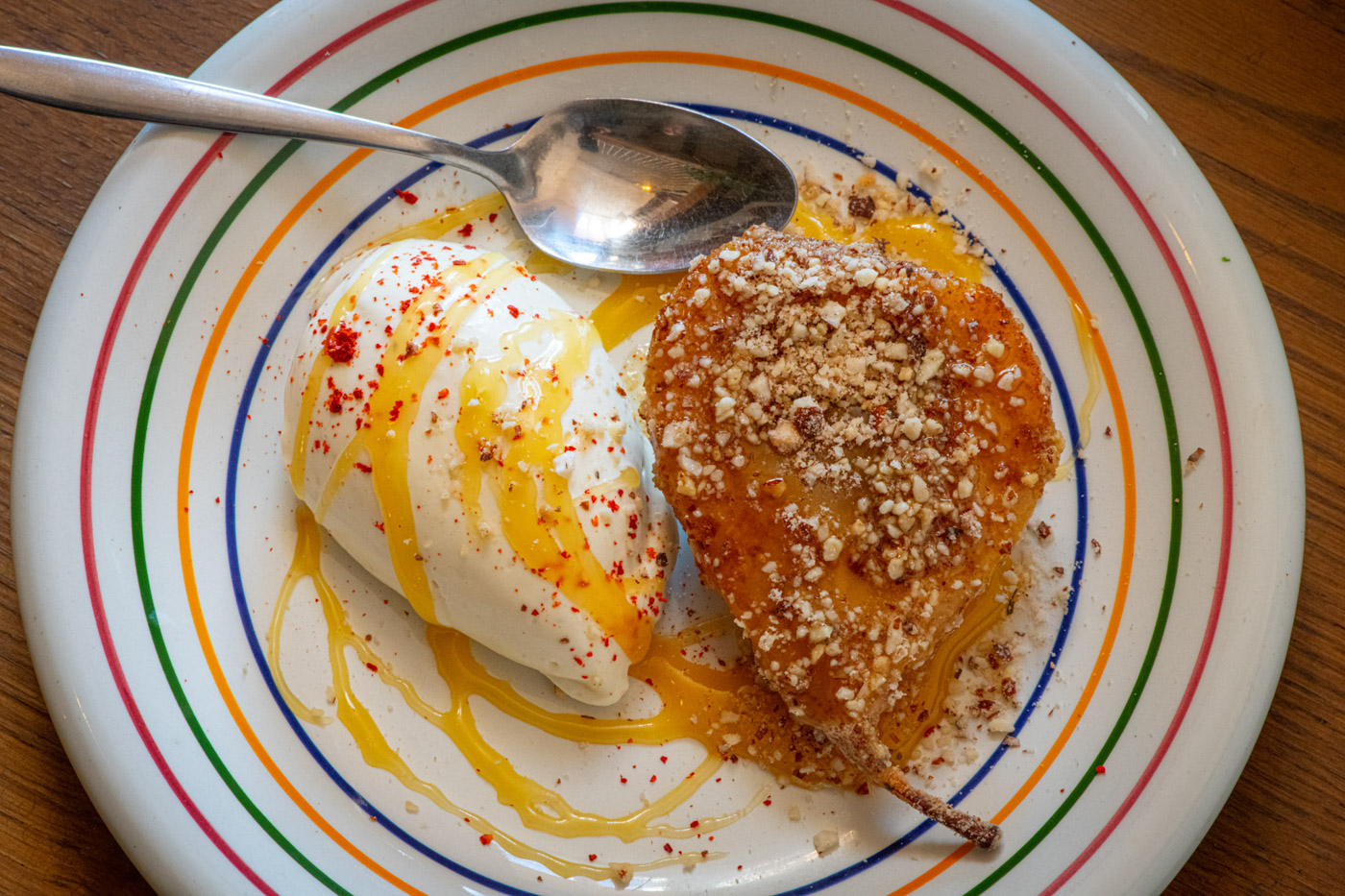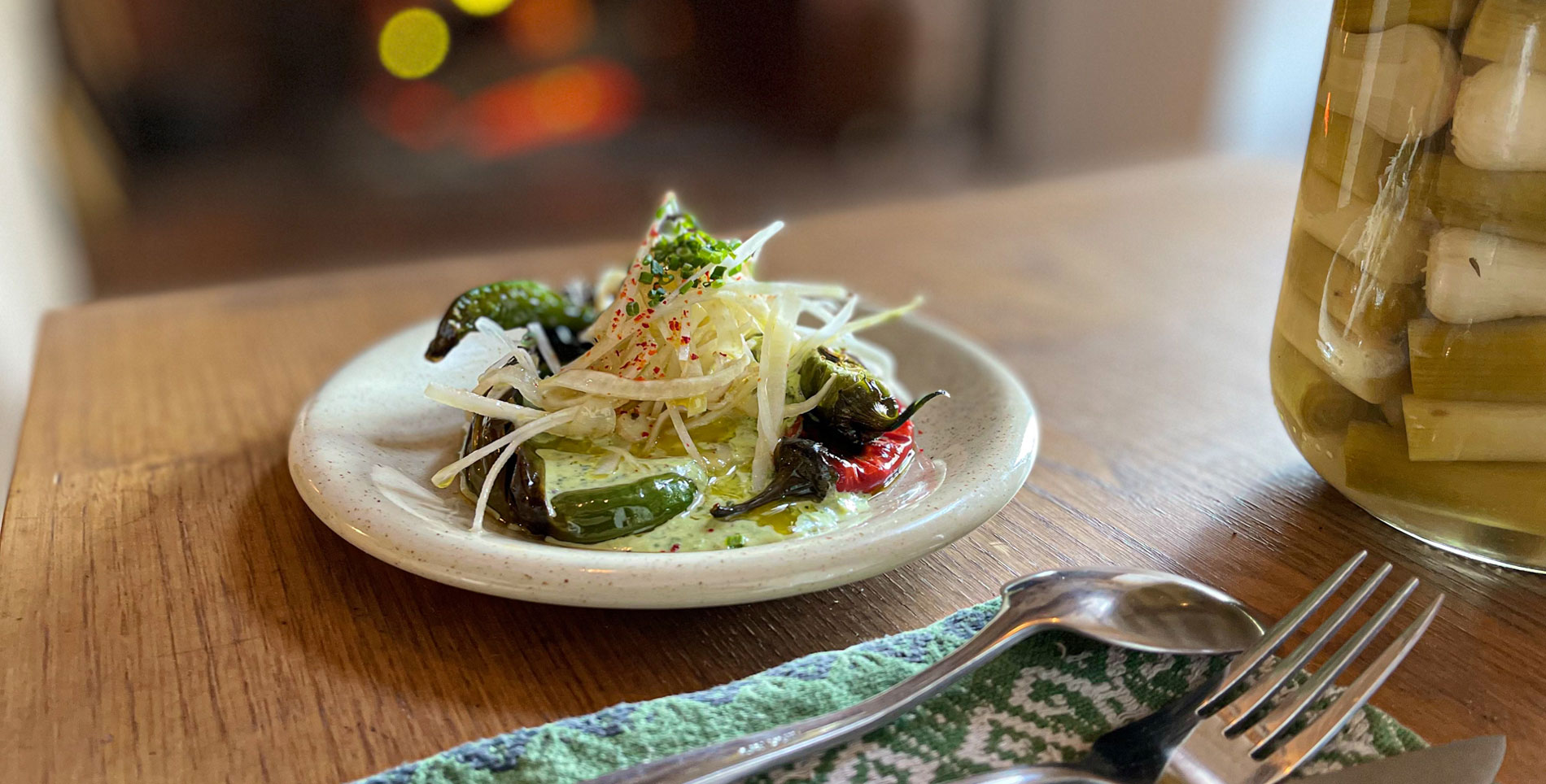In March 2019, Chef Laura Schiffman told a French journalist with La Ruche qui dit Oui that “if one day, everything collapses, I’ll still be able to welcome you at my table.” She couldn’t have known how much she was foreshadowing—not just a global pandemic that caused us to grapple with supply chains, travel and transport, but a mass exodus that was beginning from France’s capital to its villages.
From Michelin-starred Septime’s Bertrand Grébaut to James Henry, the Australian chef formerly of Bones, to Louis-Philippe Riel, formerly of Le 6 Paul Bert, and Alexis Bijaoui, formerly of L’Arpège and New York’s Blue Hill—even before the pandemic—Parisians were moving away in search of greener pastures, literally. These chefs and others opened country inns and restaurants, either in addition to or in place of their Parisian addresses.
For former Parisians Schiffman and sommelier Allistair Bellahsen, the neo-rural bug was the impetus that led them to find home in the medieval village of Sauveterre-de-Béarn in France’s Basque region.
“It came from Laura, more than from me,” recalls Bellahsen of his co-founder’s motivation to abandon Paris. “Laura had a bigger need, almost vitally, to leave the city. For me, it came bit by bit. And bit by bit, I discovered what it was to live in the country.”
In the village, they found a two-story home—the narrowest in the village—and there, they cultivated their dream: to turn it into a restaurant. “It took time and a lot of energy,” says Bellahsen. “We didn’t know what we were getting into.”
After navigating the bureaucratic red tape and architectural battles—notably in converting what had been zoned as a residence into a restaurant—however, they created La Légende.


Schiffman has since departed from the project, but Bellahsen remains more enamored than ever. “I understood that I was discovering something that was in me all along—something that was incredibly important,” says Bellahsen. “To live in a place like this, to be in contact with nature every day.”
While La Légende can easily be compared to other similar establishments in its embracing of neo-ruralism, it does stand out in one major way: its obsessive commitment to locavorism. At the restaurant, you’ll find no pepper, no chocolate, no sugar. If it’s not made or grown in the Basque region, it simply doesn’t appear on the menu.
“This constraint—or rather, this thing that can be seen as a constraint—allows us to find alternatives,” says Bellahsen, noting that local ginger is plentiful and local honey can be substituted for sugar. “And we really discover what I’d call a ‘cuisine from here.’”
Such discourses aren’t unfamiliar in a day of pervasive locavorism, but La Légende shines in its wholehearted commitment, not just to terroir—the French principle that stems from the idea that what we eat depends on where we are—but to the environmental factors at play.
The very existence of restaurants has a massive effect on the climate. Diesel fuel use, for example, accounts for about 25% of the total energy consumed within the U.S. food system, according to research published in the Journal of Industrial Ecology, notably for transport—thus Bellahsen’s dogged commitment to sourcing his ingredients closer to home.
“The first ecological principle, I’d say, is the local mindset,” he says. “Working locally with small distances, seasonality, respect for the ingredients, and never going further than 6,000 kilometers to find them.”
He makes two exceptions: coffee and wine. Bellahsen, a sommelier by trade, felt he “needed to be able to share the wines of Alsace, the wines of Burgundy.”


“It’s an exception, and you’re right to highlight it,” he says, explaining that over the past 10 years, he has become enthralled by the work of natural winemakers who practice low-intervention winemaking with no added pesticides or chemical fertilizers, who often hand-harvest and do not rely on sulfites to stabilize their wine before bottling. He’s still on the lookout for Basque and other Northern Spanish winemakers to highlight in addition to those who feature on his mostly-French list.
While this exception might seem hypocritical, in truth, it isn’t. Transport only actually accounts for about 10% of the greenhouse gas emissions of a given food (6% in the European Union). Focusing as much as—if not more—on how a food is produced is vital, and natural wine, with its embracing of biodiversity and eschewing of chemical intervention, is ideal.
Of course, Bellahsen’s commitment to the sustainability of his restaurant doesn’t stop at sourcing. Energy, for example, is a major climate cost for restaurants, from heating water to turning on the oven to running the lights. La Légende boasts an oven fueled by gathered wood to reduce the degradation of the forest. The range, meanwhile, has a built-in reboiler to reducing the restaurant’s reliance on electricity, which here is supplied not by the near-monopoly Électricité de France, but from Enercoop, a sustainable alternative that guarantees 100% renewable energy (and no nuclear) from water, wind, sun and biomass and has been recognized as a “truly green” supplier by Greenpeace. Bellahsen uses Ecomail for all correspondence; the ethical email service hosted in France donates 50% of its revenue to concrete ecological actions.
Waste is another major component of a restaurant’s sustainability, contributing to somewhere between eight and 10% of global greenhouse gas emissions, according to the U.N. Environment Programme. About 20% of food produced in France is wasted every year, according to the French Ministry of Agriculture (as compared to about 40% of the total food produced in the U.S.— data on the U.S. attributes about 18% of this waste to restaurants). Since 2016, France has already taken massive strides to reduce the issue, forbidding supermarkets, for example, from throwing away food, and passing a law earlier this year to legally bind restaurants to provide doggy bags (framed as “gourmet bags” in some places) in an effort to reduce waste. In the 2017 Food Sustainability Index, France was found to waste 234 pounds of food per person each year, as compared to 430 pounds per person in the U.S.
But at La Légende, they produce very little waste. “We have just a small garbage bag per day,” explains Bellahsen, noting most of it comes from cigarette butts. Everything else is composted or fed to local chickens or pigs. Each action, Bellahsen says, comes from a question he has asked himself at every stage of the restaurant’s evolution: “How can we reduce our consumption?”
But this attitude isn’t just about what the restaurant isn’t—it’s also about what the restaurant is. From the outset, the team sought to profile local produce and recipes. Grand Roux corn, for example, only grows in the Basque region and was nearly lost until 20 years ago when enterprising farmers began growing it again. At La Légende, it is served as polenta or bihia, a Basque equivalent, alongside local vegetables. The result is a meatless dish with a local flair that has become part of the restaurant’s identity, one of several that show off the richness of the local produce and culinary culture.
The menu at La Légende changes regularly thanks to the expertise of Chef Mathilde Dununcq, who stepped into Schiffman’s role following her departure. Dununcq hails from Northern France, but has since become an expert in the local cuisine, rising to the challenges innately set by the restaurant.
“There are a lot of things we can’t do, it’s true,” says Bellahsen. “There are also lots of things we haven’t discovered yet—not just recipes, but also ingredients we haven’t found yet.”
He’s keeping his ear to the ground for more local producers he can work with, more local recipes to feature, and more ways to tempt his clients—visitors and locals alike.
This, of course, is an essential piece of the puzzle. For a restaurant to be environmentally sustainable is one thing; it’s quite another for it to be socially sustainable. And from the very beginning, Bellahsen knew if La Légende was going to work, it would need to directly appeal to—and involve—the local population. From the local Chamber of Commerce to a collective of local architects, from the townspeople to the town hall, Bellahsen reached out to the people who became his closest collaborators and most stalwart clients. Farmers, producers and beyond have relished the chance to become involved in a project that seeks to show off the best of what they have to offer.
“These are the people we wanted to talk about, first and foremost,” he says. “And it seems coherent and evident to then work with these people, to make the restaurant work. Because they’re here.”
He isn’t just hoping to show off the locals’ work, but to create a place where they want to be. “In cities, there’s a multitude of places where you can meet up,” he says. “But in the countryside, that isn’t the case. In the countryside, every place that closes can be seen as a failure. As a drama. As one fewer place where people can come together.”
Despite Bellahsen and Denuncq’s Michelin-star-spangled resumes, and despite the growing preponderance of country restaurants run by former Parisians, Bellahsen’s goal was to become a “place of the people.”
“We need to bring the country back to life,” he says. “In this village, I’m the only one open in the evenings. When night falls, mine is the only lighted lantern,” he continues. “People come to spend time, to feel welcome. It creates a certain kind of magic.”
5 Rue de l’Abbé Duplech, 64390, Sauveterre-de-Bearn, France
Photos courtesy of La Légende.







Our comments section is for members only.
Join today to gain exclusive access.